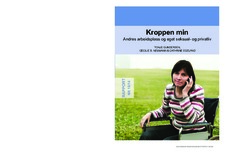| dc.contributor.author | Gundersen, Tonje | |
| dc.contributor.author | Neumann, Cecilie Elisabeth Basberg | |
| dc.contributor.author | Egeland, Cathrine | |
| dc.date.accessioned | 2020-06-07T21:06:10Z | |
| dc.date.accessioned | 2021-04-29T14:08:45Z | |
| dc.date.available | 2020-06-07T21:06:10Z | |
| dc.date.available | 2021-04-29T14:08:45Z | |
| dc.date.issued | 2014 | |
| dc.identifier.isbn | 978-82-7894-534-6 | |
| dc.identifier.issn | 0808-5013 | |
| dc.identifier.uri | https://hdl.handle.net/20.500.12199/3440 | |
| dc.description.abstract | How does disabled people perceive having to receive personal assistance, and to have a body that is the work place for other people? Moreover, how is it for personal assistants to have another person’s body as their work place? To explore these questions we interviewed 11 adults (age 20-54) with physical disabilities (employers); of these nine had early onset impairments and two had impairments discovered in early adulthood. We also interviewed six people working as personal assistants and five representatives from companies and municipalities organizing assistance services. Additionally we have observed the interaction between seven assistants and their employers. One aim of the study is to provide knowledge utilizable for developing good working relations between assistants and employers. We started out by wanting to investigate the handling of intimacy and sexuality in this relationship. How did assistants and employers negotiate the borders between privacy and body? Our main finding was that intimacy as sexuality was not an important issue, as long as openness and respect characterized the relationship. Overall, we found that the employers had what we will characterize as a pragmatic approach to their own body and sexuality. This pragmatism relates to their continuous need for assistance in nearly all aspects of life involving the body. However, their pragmatic approach was vulnerable to how those assisting them related to them and their body. Lack of consideration for their bodily vulnerability as well as emotional disrespect caused unnecessary pain and made the employers’ question their own worth. Through the interviews with employers, it was evident that for them it was important that their need for privacy was met with respect, and intimacy seemed more related to such issues than to sex. Intimacy in the sense of respect for privacy and autonomy, implies having control over the management of different tasks related to the household, own body and privacy in the family. The employers thus emphasized the importance of giving sufficient and good instructions to the assistants about confidentiality and discretion. Since the employers perceived this kind of intimacy as extremely important, they preferred personal assistance to nurses employed by the municipality. According to the employers, receiving help and care from a variety of different people strongly reduced their ability to maintain and control personal intimacy. Besides, a general view among the employers is that they need service and not care. According to the employers municipal employees e.g. nurses, had difficulties understanding the dissimilarity between service and care, resulting in what they perceived as paternalistic and patronizing behavior. Exploring differences in experiences, our findings indicate that the onset of disability could influence the employers’ perception of receiving assistance. Those born with impairments express that personal assistance reduces their vulnerability and gave them the possibility to take control over their bodies and sexuality. Those with a late onset impairment, on the other hand, found receiving assistance more difficult, and as a reminder of their forever-vulnerable situation. When it comes to gender, we found that women who needs assistance for personal hygiene wanted female assistants, for the male employers the assistants’ sex was of less importance. The assistant’s gender also seems to be of less importance for women in need of assistance to tasks not related to personal hygiene and bodily intimacy. Looking at age we found that for the young employers (20–35 years of age), the assistants age was an issue. They wanted assistants at their own age. | en |
| dc.description.abstract | Mange med nedsatt funksjonsevne behøver hjelp i hverdagen, og flere og flere får slik hjelp fra personlige assistenter. Denne studien tar utgangspunkt i erfaringer med å motta og å yte assistanse. Spørsmålet som belyses, er hvilken betydning kroppen som sete for intimitet og seksualitet har i relasjonen mellom den som mottar og den som yter assistanse. Et delmål har vært å bidra til kunnskap om god praksis i relasjonen mellom mottaker og yter av assistanse. Hovedfunnet er at god kvalitet på relasjonen, i betydning av at den vurderes som trygg og tydelig av begge parter, er viktig for kroppsoppfatning og erfaringer med intimitet og seksualitet. | no_NB |
| dc.publisher | Oslo Metropolitan University - OsloMet: NOVA | |
| dc.relation.ispartofseries | NOVA Rapport 18/14 | |
| dc.subject | NOVA--The disabled--Children--Child welfare | |
| dc.title | Kroppen min. Andres arbeidsplass og eget seksual- og privatliv | no_NB |
| dc.type | Report | |
| fagarkivet.source.pagenumber | 109 | |
